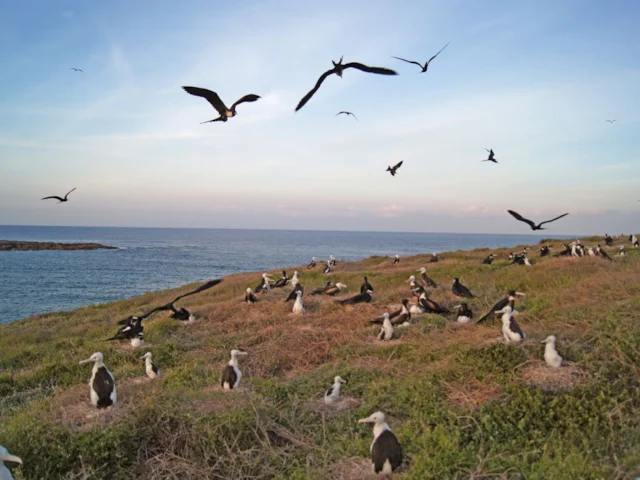RSPB search for Caribbean seabird feeding areas
96db4e36-6b5b-42e9-a7bf-02d431bc07d5

The RSPB and DEFRA have begun a satellite-tracking scheme to try and find the feeding areas of the threatened seabirds of UK Overseas Territories in the Caribbean.
The two-year study intends to find important feeding areas for a range of Caribbean seabird species on the UK Overseas Territories of Anguilla and British Virgin Islands (BVI). The study will use GPS technology to track Brown Boobies, Sooty Terns and Magnificent Frigatebirds on Dog Island, Anguilla, and Magnificent Frigatebirds on Great Tobago Important Bird Area (IBA) in the British Virgin Islands.
The scheme follows on from pilot work in 2012, where 20 Brown Boobies were tracked on Dog Island and found to travel up to 300 km in a round trip.
Dog Island IBA is the second most important site for seabirds in the Caribbean, hosting four globally important populationscomprising more than 1 per cent of the total global population, despite its small size of just 2 km2.
Dog Island and Great Tobago support two of the four Magnificent Frigatebird colonies in the area. In 2012, 60 birds were recorded dead at the Great Tobago colony due to entanglement with monofilament fishing line. Local partners are removing line from the existing trees with support from the RSPB, and it is hoped that tracking may help to identify areas where the birds are encountering the fishing line and enable solutions to be explored.
The work will provide new information on these species’ feeding ecology and help to identify the most important feeding areas, which can inform marine planning in the region. Potential threats to seabirds in Anguilla and BVI will also be identified and long-term local seabird monitoring programmes established with local partners.
The project is funded by DEFRA’s Darwin Plus Scheme. Please see www.caribbeanseabirds.org.uk for further updates!
The two-year study intends to find important feeding areas for a range of Caribbean seabird species on the UK Overseas Territories of Anguilla and British Virgin Islands (BVI). The study will use GPS technology to track Brown Boobies, Sooty Terns and Magnificent Frigatebirds on Dog Island, Anguilla, and Magnificent Frigatebirds on Great Tobago Important Bird Area (IBA) in the British Virgin Islands.
The scheme follows on from pilot work in 2012, where 20 Brown Boobies were tracked on Dog Island and found to travel up to 300 km in a round trip.
Dog Island IBA is the second most important site for seabirds in the Caribbean, hosting four globally important populationscomprising more than 1 per cent of the total global population, despite its small size of just 2 km2.
Dog Island and Great Tobago support two of the four Magnificent Frigatebird colonies in the area. In 2012, 60 birds were recorded dead at the Great Tobago colony due to entanglement with monofilament fishing line. Local partners are removing line from the existing trees with support from the RSPB, and it is hoped that tracking may help to identify areas where the birds are encountering the fishing line and enable solutions to be explored.
The work will provide new information on these species’ feeding ecology and help to identify the most important feeding areas, which can inform marine planning in the region. Potential threats to seabirds in Anguilla and BVI will also be identified and long-term local seabird monitoring programmes established with local partners.
The project is funded by DEFRA’s Darwin Plus Scheme. Please see www.caribbeanseabirds.org.uk for further updates!

